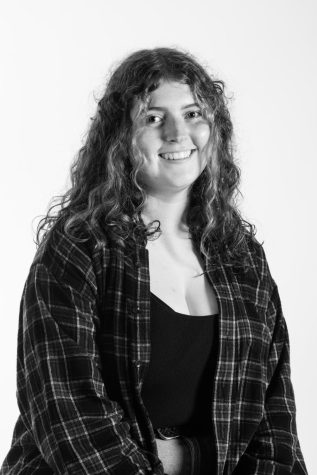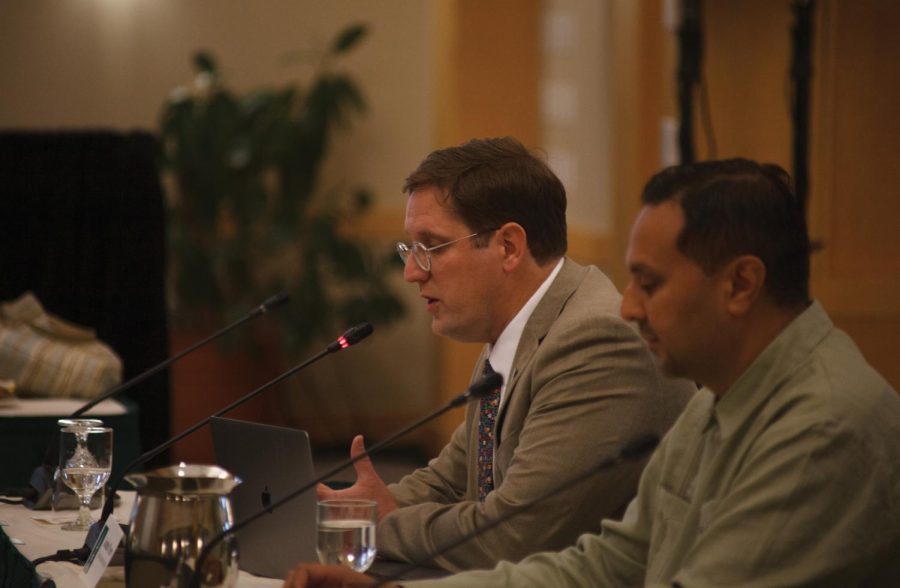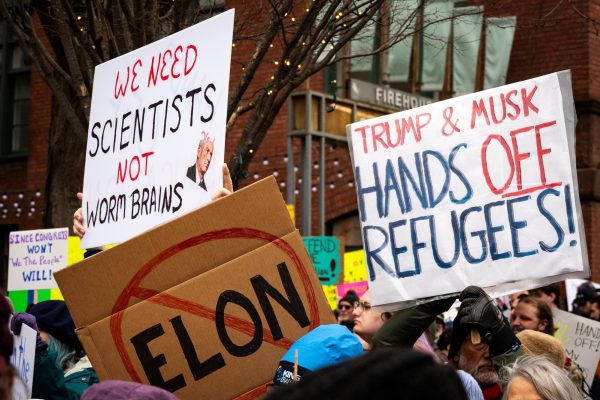What to know from the fall 2022 board of trustees meeting
Jonathan D’Amore, special assistant to the President, and Amer Ahmed, vice provost for diversity, equity and inclusion, present the University’s new land acknowledgement statement during the board of trustees’ full board meeting Oct. 29.
The full board of trustees meeting approved a land acknowledgement statement for official University use as well as a consent agenda containing several updates for UVM on Oct. 29.
The acknowledgement statement, created by the Division of Diversity, Equity and Inclusion, and members and leaders of the four recognized Abenaki tribes of Vermont and the Vermont Commission for Native American affairs, is intended to recognize UVM’s historical acts of land usage, said Amer Ahmed, vice provost of the Division of DEI.
“Acknowledging the serious and significant impacts of our histories on Indigenous peoples and their homelands is a part of the university’s ongoing work of teaching, research, and engagement and an essential reminder of our past and our interconnected futures for the many of us gathered on this land,” the acknowledgement states.
In addition to the creation of the official land acknowledgement statement, the College of Arts and Sciences is in the process of creating potential coursework for an Indigenous studies program, said Patricia Prelock, provost and senior vice president.
The University has been in frequent communication and meetings with local Indigenous tribes to continue to engage with them, Prelock said.
“There’s a concrete element of how we can continue to foster some of those relationships and draw from [Indigenous] knowledge,” Ahmed said.
During the public comment segment of the meeting, Eleanor Miller, president of the faculty union United Academics, spoke about cuts to the liberal arts and issues pertaining to the faculty union, which is currently in negotiations with UVM over their contract.
“UVM’s efforts to encourage technological innovation and entrepreneurship will be severely hampered by a continuation of deficits in human infrastructure,” Miller said.
UVM has repeatedly taken actions, such as closing their childcare center and offering raises below the standard amount, that have worsened faculty retention rates, Miller said.
She said the cuts to language and religion departments were linked to a perceived mishandling of antisemitism allegations on campus, which UVM has recently been under fire for, she said.
The faculty union is also still pushing for representation on the board of trustees, which they’ve been pursuing on since the beginning of the year, according to a Feb. 22 Cynic article.
“We feel [this] is an opportunity to make UVM a better place for all community members by augmenting the view you get from the top with a view from the ground up,” Miller said.
Two other speakers signed up to speak but did not attend the meeting.
The UVM Union of Students also put out a call to action to protest in support of other speakers during the public comment segment in an Oct. 27 Cynic letter to the editor, but this protest did not take place.
The board unanimously approved the consent agenda, which contained resolutions from each of the separate committees.
The Educational Policy and Institutional Resources Committee approved a resolution sanctifying the Rutland County 4-H Foundation and the Addison County 4-H Foundation as official University-affiliated organizations through UVM Extension Services.
It also created a Ph.D. in social-emotional and behavioral health and inclusive education in the Graduate College and College of Education and Social Services and terminated the B.S. in athletic training in the College of Nursing and Health Sciences.
Additionally, the committee approved the creation of a new health building called the Osher Center for Integrative Health.
Out of the Budget, Finance and Investment Committee, the board approved the resolutions about maintaining the endowment budget policy and endowment administration fee policy unchanged—the policies allotting the amount of money that can be spent from the endowment and how it can be spent—and combining two investment funds used for strategic revenue gain into one.
The board originally planned to adopt the 2022 Campus Plan—a plan designed to explain the direction of physical campus growth over the next decade—but pushed further discussion and approval to December.
The 2022 Campus Plan broadly entails minor improvements to existing campus buildings, with major growth only expected in the realm of additional student housing, according to the executive summary of the plan.
It was designed over 18 months starting in 2020 in association with a working group of University representatives and the architectural consultant group Sasaki Associates, the plan stated. It follows principles such as connectivity, accessibility and sustainability, prioritizing efficiency and what will lead to student success.
If approved in December, the Campus Plan predicts the Trinity district will see the most amount of developmental work over the allotted time frame for the plan, with goals for the Central, Redstone, Athletic, Centennial and South campus districts focusing on preservation, the plan stated.
Outside of the consent agenda, the board approved a resolution creating a working group on the ongoing athletic multi-purpose center project to closely monitor the project, serve as liaisons to administration and to provide a report update at the February 2023 board of trustees meeting.
The meeting also included verbal reports from each committee on what they discussed during their individual meetings beyond what was in the consent agenda.
Audit
There were no issues to report with the fiscal year 2022 financial statement and uniform guidance statements, said Shap Smith, legislative trustee.
The audit of the President’s residence and travel funds show the allocations are within reason for the committee and are not an exceptional expense, Smith said.
The lack of things to report on is a good sign for the University, he said.
Educational Policy & Institutional Resources
The committee received reports on sexual misconduct and action for support prevention from Erica Caloiero, vice provost for student affairs, and Nick Stanton, director of the Office of Affirmative Action and Equal Opportunity, said Gubernatorial Trustee Carolyn Dwyer.
The report included the creation of four working groups: prevention and education, policy procedures, case response and stakeholder communications, Dwyer said.
Amer Ahmed gave the committee a report on inclusivity at the University, highlighting results from the 2022 Campus Climate Survey, Dwyer said. Seventy percent of all respondents indicated a positive sense of inclusivity on campus, but this number is a 4% decrease from the results of the last survey in 2019.
The College of Arts and Sciences gave a presentation about their plans to incorporate global engagement and increase innovation and entrepreneurship on campus by building long-term strategies starting from a student’s first year on campus to engage them in these principles, Dwyer said.
Budget, Finance & Investment
The finance committee approved resolutions that were approved by the full board meeting on Oct. 9 detailing several fees and costs for students, said Self-Perpetuating Trustee Don McCree.
The resolutions approved the continuation of the fifth consecutive year of freezing the cost of attendance at UVM, as well as freezing undergraduate and graduate comprehensive fees, graduate student senate fees, continuous registration fees for graduate students, room and meal plan rates and summer session tuition, according to the committee’s materials.
“Our unprecedented five years of freezing tuition has not been easy, but I firmly believe it is time to control the costs of higher education,” UVM President Suresh Garimella said in an Oct. 28 YouTube video. “UVM is proud to take the lead in putting our words and our values into concrete actions.”
Concerning the stock market, the global market is in bad shape, and thus some of UVM’s investments performed poorly this year, McCree said. Bonds and equities underperformed in particular.
Dual enrollment at UVM is increasing, with 564 high school students, as opposed to the previous fiscal year’s 484 students, McCree said.
VT Agricultural College Board
The Agricultural College Board committee discussed the high turnover rate of senator involvement in the legislative session and planned a day for the 2023 session members to engage with UVM and meet officials and students to increase retention, said Legislative Trustee Carol Ode.
The board is also asking for a 3% budget increase from the governor’s budget, including a $3 million request for skilled trade labor classes at UVM and other state colleges, Ode said.
UVM Board
The UVM Board approved financial bonds for $650,000 for Vermont high school students and acknowledged a decline of 6.4% in investment value, which is reflective of the state of the market as a whole, said Self-Perpetuating Trustee Otto Berkes.
After these reports, the full board entered executive session to discuss contracts, labor relation agreements and receive advice of legal counsel.The next board of trustees meetings will take place Feb. 10-11, 2023, according to the board of trustees webpage.

(She/they) Halsey McLaen is a junior from Groton, Connecticut, majoring in environmental sciences with a minor in reporting and documentary storytelling....







